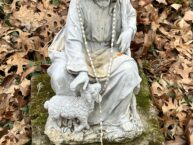 March 2, 2018: May God’s words alone be spoken, may God’s words alone be heard. Amen.
March 2, 2018: May God’s words alone be spoken, may God’s words alone be heard. Amen.
It is so good to be back! I missed you all, and thank you for your prayers! I can tell you, I felt like my body was getting destroyed recently, not only with the hospitalization, but dang that snow on Friday was a real tough one to clear out!
Which got me to thinking about a lot of things when I sat down with the scriptures for this Sunday to write a sermon, because Jesus is talking about his body being destroyed – and put right in just three days. Apparently, he has better doctors than I do, but then again – he is the savior of the world, right?
You know, I think there are a lot of folks, perhaps you are one of them, who hear scripture stories on Sunday mornings, and wonder what the heck that has to do with your lives on Monday mornings. Of course, the commandments, given to Moses in the passage from Exodus we heard this morning, might bear some relevance – right? I mean, we shouldn’t murder, or steal, or covet our neighbor’s stuff. Which reminds me of a funeral a few weeks ago, when one of the people set to speak about the deceased wanted to know if he could say the word ass (believe me, there was a good and funny reason). I reassured him it was okay, after all – it’s in the bible. The King James version of this Exodus passage doesn’t say not to covet your neighbor’s donkey, but your neighbor’s…well, you know.
Anyway, that is a passage you can wrap your head around and take with you into work on Monday. Your boss gets on your case – you say to yourself “I must not commit murder. I must not commit murder…” But, what would this passage about Jesus driving out the money changers have to say for our current lives. I don’t know about you, but I didn’t see anyone bringing a dove or a lamb in here for sacrifice – Lord knows, I would hope not. Nor did I see anyone exchange their currency from the US for some sort of church coins. So, what is up with this, and why do we care?
Now remember this gospel is one we always need to be cautious about – in fact, it nearly didn’t make it into our canon – the bible – for a whole host of reasons. This is the gospel where we have to flip all those “The Jews” statements, right? Notice today that I did not read the text as written, and you know why by now, if you’ve been coming here for any length of time. Who is Jewish in this story? – EVERYBODY – Jesus too. So it would be like saying “The Jews said to the Jew Jesus…” So, we set the anti-Semitism aside, as well we should.
But another thing is that this gospel, written late in the 1st or early in the 2nd century BCE, puts this story about the temple cleansing right after our guy Jesus begins his ministry – in Chapter 2 – with only the miracle at the wedding in Cana under his tunic belt. He doesn’t even have any street cred – save being one awesome person to invite to a wedding. I mean, nobody seems to care about him yet. Even the money changers weren’t all that upset. They just sorta say “What sign can you show us for doing this?” Or put another way “Dude, you need to drink less coffee – just chill already.” In other words – not a really big deal…well, until he tells them he will raise a destroyed temple in three days.
So why do these authors put this here where it doesn’t seem to belong, when the other gospels have it near the end of Jesus’ life? The authors do this for a reason – to establish right from the start that Jesus ushers in a new way of being…a new way to encounter the divine presence…and that he will die doing it. They weren’t about to leave this for the end of the story like the other gospel accounts – nope, without spoiler alerts – they gave the ending right up front – before folks had a chance to really dig into their popcorn. They wanted to make it crystal clear from the start – Jesus is overturning everything – even what it means to be a person of faith – even where we need to be to encounter God’s presence. They even tell you what his words mean “But he was speaking of the temple of his body” (putting it in neon that the meaning of the temple has changed). That is why it is right here up front – so that you view everything else he does within that lens. It’s the biblical equivalent of telling viewers at the beginning of the first Star Wars Movie “psst, Darth Vadar is Luke’s father, and Princess Leah is his sister!” I mean – it would kinda change how you’d experience the rest of the story, right?
So, let’s look at this temple encounter story a bit more closely.
The first thing we need to know is that these money changers were not doing anything wrong. The temple was the place people brought their best offerings as tithes to show thankfulness to God – they offered them in the temple – a place, where their faith taught them, God and humanity were brought together. There was no problem with having a marketplace for money exchanges in the temple, in fact, that was biblical – it was supposed to be there. All those people doing that – they were following the scriptures. They were following the law of God as handed down to them in Torah – the same scriptures we use.
In Deuteronomy it clearly states that if you cannot bring your offerings to God across a great distance, it is acceptable to sell your offering for money, then exchange that money at the temple for offerings of animals, or whatever. Further, other Jewish law made it clear that you could not use imperial coinage in the temple, because it bore the image of the emperor – which would be idolatry – so you had to exchange your money. So, these folks were only doing what their faith – their scripture – taught them.
Why on earth then did Jesus drive them out – ahhh, see now we are getting somewhere. Now we are getting to why this passage matters to us now, even on Monday mornings.
Jesus was turning more than tables. Jesus was overturning what it means to be a child of God. He is tossing out the understanding of what “temple” means. The temple is not where God is – or at least not the only place God is.
I am reminded of a favorite set of books, the Chronicles of Narnia, written by C. S. Lewis’, the Anglican and prolific apologist for the faith. I am reminded of it because the books have a distinct Christian message, one that parallels the message of this gospel story. “If you remember, in The Lion, the Witch and the Wardrobe , the four Pevensie children travel from war-torn London to Narnia, [a magical place] and there meet the great lion (and Christ-figure), Aslan. With [Aslan’s] help [they] defeat the White Witch who holds Narnia captive in a perpetual winter….
At the end of the third book, Voyage of the Dawn Treader, Aslan meets Lucy and Edmund at the edge of the Eastern Sea and tells them […] that this will be their last trip to Narnia. Lucy is distraught at the prospect of not seeing the beloved lion again, but he reassures her that she will see him in her own world. When she is surprised that Aslan is present in her world, he tells her that the whole reason for bringing her to Narnia for a time was so that, coming to know him well here, she would recognize him more easily there.”[1]
Now that is a message for the church, is it not!
It is the message of this gospel certainly – because what was true of Aslan, is true of Christ – of God. God became incarnate in Jesus so that we might recognize the God that was present in the world – so that we could break free from the boxes we thought we could put God in – our temples, arks, even our scriptures.
To be clear, Jesus didn’t eschew the temple – quite the contrary – he went there, sometimes reading and interpreting the scriptures. Nor should we think that there aren’t places where we feel God’s presence more deeply – those thin places as some call them – where we seem to feel, to see, to listen more deeply in our soul. Places like the church, or atop a mountain, or a baby’s smile, or while watching the sunset over the ocean – all are places – moments really – of openness to encountering the divine presence – and so we do. Where are those places for you? Where do you feel most connected to God?
And while you think about that, let’s also consider another thing Jesus is making clear – that scripture isn’t the be all end all of what it means to live as we should live. Yes, he was a good Jewish boy who read Torah in the temple, but he also overturned the table of “it’s in the bible, and therefore it is right and perfect.” And Lord knows, well – actually he did know – there is still much to overturn in our own faith with regard to scripture – how we read it, and how we use it.
As we know, there are far too many who read snippets of scripture out of context, and declare that LGBT people are not loved by God, or that women shouldn’t be leaders in the church – all while eating bacon, wearing 50/50 poly cotton, piercing their ears (or other parts), cutting their hair, and a whole host of other scriptural laws they choose to ignore – not to mention all the ridiculous amount of male language for God littered throughout the bible, written and authorized by men, of course, turning God into some big old Father figure.
Jesus, who loved his faith, loved Torah, was putting an end to this scriptural idolatry – he did that a lot in his life. He never allowed the scriptures to override love, grace, compassion, and justice. He healed on the Sabbath, ate with defiled hands, and generally drove the temple authorities crazy with his seemingly irreverent attitude toward biblical law. But Jesus knew that while important, scripture was a tool of faith – not something to be worshiped itself. Law is good, but only to where it serves the greater good – only when it loves as God loves.
You see, those who were their exchanging money were so focused on following scripture, that they traveled long distances to worship at the temple in Jerusalem, something the poor in their community would be hard pressed to do. They traveled there to find God – to be where God lived. The more you gave, the more offerings you brought (or exchanged money to buy), the closer to God you were thought to be – you were more righteous.
But, Jesus is saying God cannot be boxed into a building, even one as beautiful as the temple had once been. This was important to the people hearing all of the gospels – because…there was no temple. It had been destroyed again in 68-70 CE – around the time the earliest of our gospels was written, but long after Jesus had been crucified. Where were they to go to find God? How could they be Jews anymore?
The gospels answer this by saying that the temple is not required to encounter God. God is found everywhere! And here’s the thing…If Jesus, the incarnate one, is the temple – one of those places where God and humanity intersect. Where do we go to find him? He tells us in his life – we find him in the eyes of the poor, the imprisoned, the sick, the stranger – that’s the other part of the Jesus story. These faithful people didn’t need money changers, or even to come to Jerusalem – they need only worship the God in their midst, to see the poor near to them, and love as God loves.
And here’s the cool, unspoken, subtext of this story – as the body of Christ – we are that temple too – that intersection of divine and human – and bring that with us wherever we are. Imagine that – we not only encounter God here – but in one another, in the mirror, and in the world. We encounter God in all of creation, and all of creation encounters God in us.
Think about that. Claim that.
Because as Christ alive in the world, we have some tables to overturn too:
The table that values scriptural literalism over compassion and justice for women and LGBT people.
The table that also ignores scriptural calls to welcome the immigrant – the stranger in our land.
The table that says our faith is practiced on Sundays inside these walls, and left here until we pick it up again the following week.
The table that says that to get in these doors, you must bring something with you.
We need to topple these tables – and to be clear we also need to enter these doors – you do need to come to church.
But wait – didn’t Jesus say you didn’t? No, not really. You see, like the temple – the church is also not required. Never thought you’d hear a priest say that, right – that the church is not required? No, the church is not required, but it is very much needed, and so are the temples and the mosques. The church is needed, because the life we live – if we really embrace the truth Jesus is giving us – will be radically amazing, soul filling, life giving…and also – exhausting. Jesus needed rest, needed time to worship, needed a place to pray. We need that too.
So yes, this shouldn’t be a place you come to find God – because Visa isn’t the only thing that is “everywhere you want to be.” God is too. No, this isn’t where you come to find God, or at least not the only place – for God surely is here. This is where you come to allow God to restore you, to renew you, to gain strength in the Christ we find in one another – and in the Eucharist.
This also shouldn’t be the place you come to show how good you are by what you bring to the table. The church is, or should be, where there is no entrance fee needed – no perfect doves or sums of money. Here, you are welcomed just as you are – a wonderful beloved child of God. Here – no matter where you were born, what gender you claim, what language you speak, or who you love – you are welcome. The only sacrifice you need make is your time willingly given, but you get back so much more.
During the season of Lent, we emphasize this return to the church even more, not because this is where we can find God, but to encourage focused attention on our words and actions in the world that we may see the God present in all of life – waiting for us to turn about, to see Her at work all around us – inviting us to experience that divine presence – no trip to Narnia is needed.
We return here to remember who we are – the body of Christ for a broken world – the temple where others may encounter God’s grace and love. To consider the ways we treat that temple, and reflect on what that says about our faith.
We return here to remember that God became human and dwelt among us, knowing the cost, doing this for us, that we might break free from the bonds of human limitations we place upon ourselves, and on others – for our own salvation, and that of the world.
So, here’s a final thing to think about then…
What will you do with that gift of knowing who you are – the temple of divine presence – of knowing the awesome possibility of encountering the divine all around you – of knowing the reality that you do not need to travel to a magical place to be with God?
That, I pray, is something you will take with you to work tomorrow, and for all your life.
Amen.
For the audio from the 10:30am service, click here, or subscribe to our iTunes Sermon Podcast:
[1] From davidlose.net.
The Rev. Diana L. Wilcox
Christ Church in Bloomfield & Glen Ridge
March 4, 2018
Lent 3
1st Reading – Exodus 20:1-17
Psalm 19
2nd Reading – 1 Corinthians 1:18-25
Gospel – John 2:13-22






